
The Givers
Date Published: May 8, 2020
In honor of National Nurses Week, we asked eight nurses from across the Mount Sinai Health System to reflect on their experiences during the COVID-19 pandemic. They shared their triumphs, struggles, and thoughts on what it means to be a nurse.
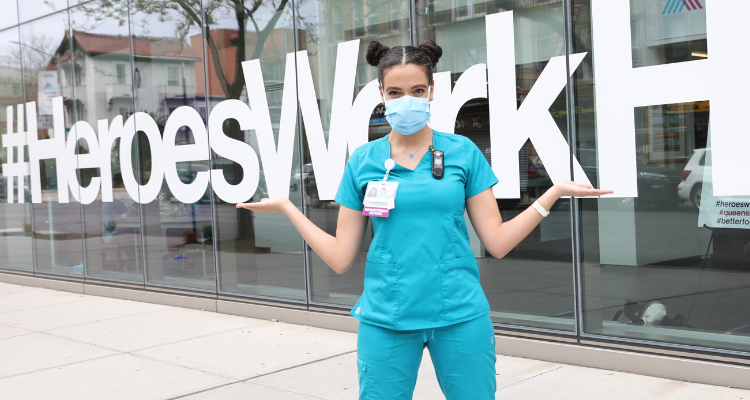
Hoda Farghaly, RN at Mount Sinai Queens
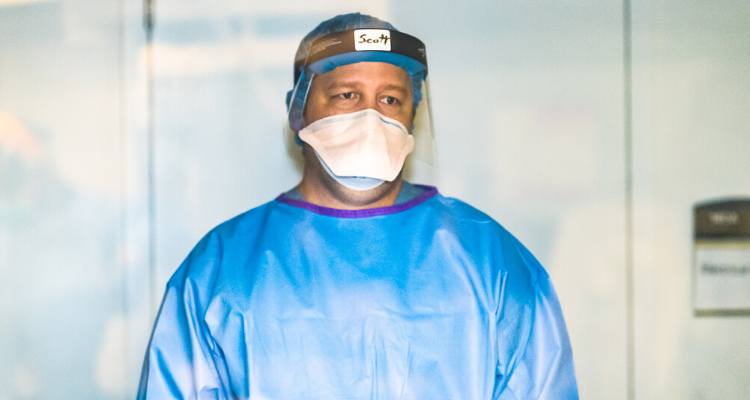
Casey Scott, Night-shift RN at Mount Sinai Brooklyn
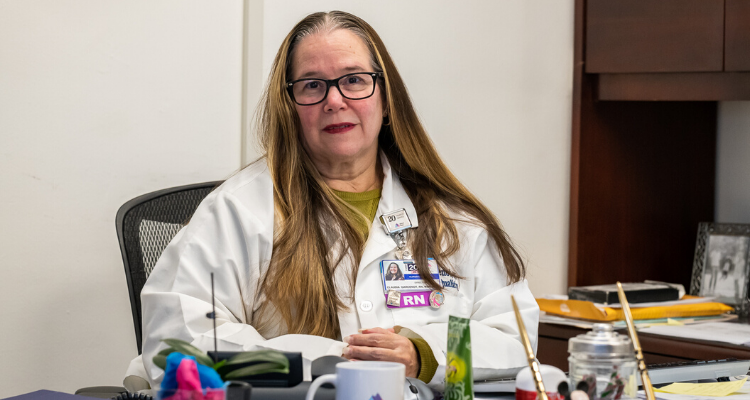
Claudia Garcenot, MSN, RN, Interim Chief Nursing Officer at Mount Sinai Brooklyn
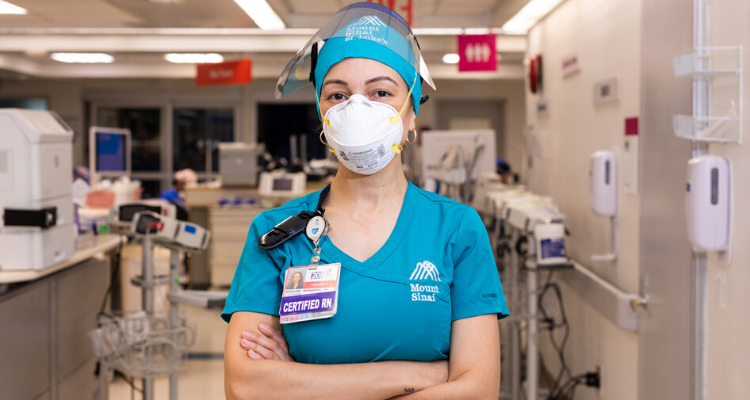
Madeline Hernandez, Emergency Room RN at Mount Sinai Morningside
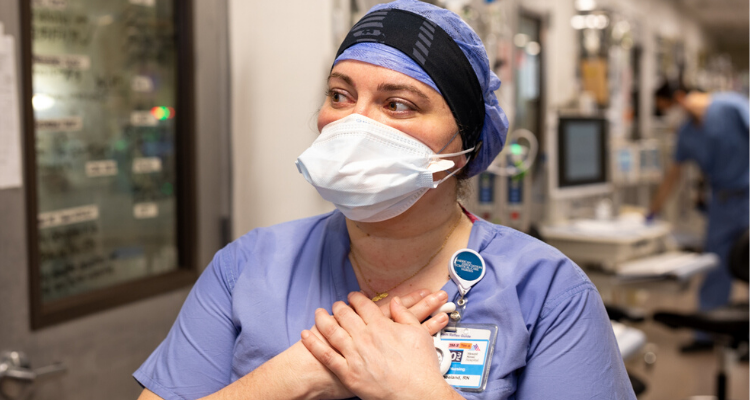
Valerie Burgos-Kneeland, Intensive Care Unit RN at The Mount Sinai Hospital
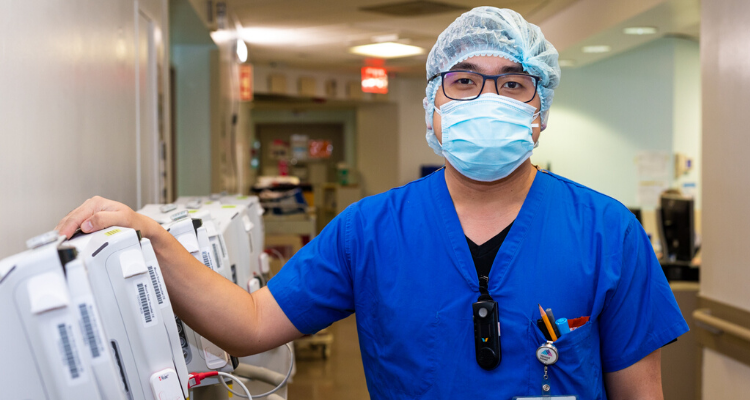
Manuel Corpus, Cardiac Intensive Care RN at The Mount Sinai Hospital
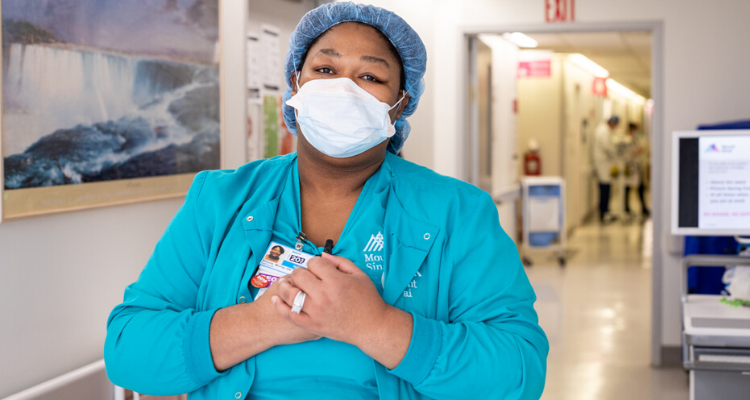
Simone Murray, Med-Surg RN at Mount Sinai Morningside
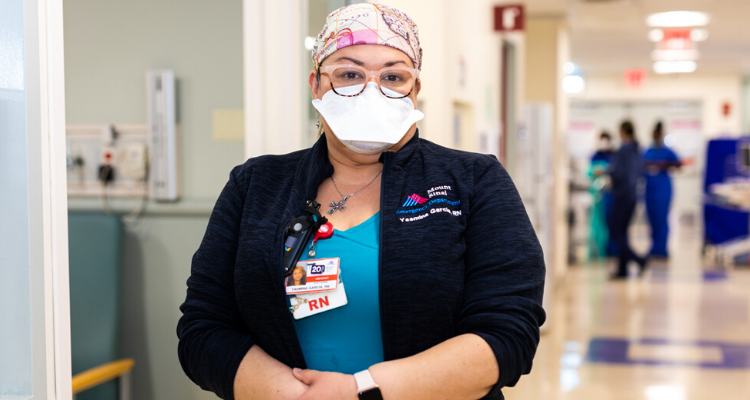
Yasmina Garcia, Emergency Room RN at Mount Sinai Morningside
Podcast Transcript
Host: 00:00
From the Mount Sinai Health System in New York City, this is Road to Resilience, a podcast about overcoming adversity. I'm Jon Earle. It's National Nurses Week, and this year with the pandemic, we're especially grateful for our nurses. Those of us away from the front lines can never fully understand what it's been like for them. But we can try, and I think by trying we gain a fuller appreciation of what we're celebrating when we celebrate Nurses Week. And we're also reminded of the importance of supporting our nurses who've done so much for us. For this episode, we spoke to eight nurses from across the Mount Sinai Health System. They shared their stories from the pandemic and their reflections on what it means to be a nurse. The following is an audio collage of what they told us. I hope you enjoy it.
Casey Scott, RN: 00:50
I'm actually fairly embarrassed to say that I didn't think that it was going to be a big deal. The news and the politicians were all saying that it was just like the flu and it wasn't going to be that bad and all of those kinds of things. So the last night that I worked before hell week started, she was 41 or 42, completely healthy, no medical problems, no medical issues. And this woman looked very, very similar to my partner, a striking resemblance. Like if I just saw them together, I would have thought that she was like an older sister. And she came in like on the verge of death. And in truth, it really freaked me out. And that was the first patient that really kind of flipped the switch for me.
Madeline Hernandez, RN: 01:43
March 17th we really saw COVID-19 for the monster that it was. I remember a point that day that we had five resuscitations at the same time. And I was the resus nurse that day and I was running from room to room to room and I realized that it was almost already seven o'clock and the next shift came in. We didn't eat, we didn't drink, we didn't go to the bathroom. It was just nonstop. And I worked at Ground Zero, was deployed to Puerto Rico and worked at a FEMA hospital, worked 14 hour days for 14 days, and it was like the first time that I really felt like this was a disaster, like a real disaster.
Casey Scott, RN: 02:25
In normal times we have 30, maybe 40 patients maximum at the peak of the day. And I had one shift where we had 92 patients. And I remember feeling like it was surreal. The craziness that you imagine, the insane situations that you read about in the news happening in other countries had come to us, and it was here in our home.
Manuel Corpus, RN: 02:52
So yeah, after the first day, I cried. I was shaking. I didn't know whether I was going to be able to pull through. I felt like, I don't know if what I was doing was right or proper. And it made me anxious as to whether I could easily get this and bring it home to my family.
Casey Scott, RN: 03:21
My partner and I had several long conversations where I tried to convince her to rent a small cabin or something upstate and just stay away until this is gone. Of course she wouldn't go. She said that she'd rather be here if I get sick. I take a large amount of precautions. I strip in the hallway. I leave everything, like literally everything except for my underwear stays outside. And thankfully our bathroom is right next to the door so I can go immediately into the shower and not touch anything until after I've bathed. I mean, even with that said, you can't disinfect your lungs. You can't disinfect the inside of you.
Simone Murray, RN: 04:06
Lord Jesus, thank you for today. Help me to stay calm. Help me to show kindness. Help me to do the right thing. Help me, Lord, to protect myself so I can protect my family at home. You have to pray. You have to ask God to take away the fear from you. Because if you go to work with that fear, you're going to make a mistake. And once you make that mistake, you potentially expose yourself to the coronavirus. You potentially might do harm to your patient because you're not focused anymore.
Claudia Garcenot, MSN, RN: 04:43
If you ask a nurse of 40 years, "Why did you become a nurse?" They usually say things like, "Oh, I wanted to help people," or, "I wanted to give back." And they say the same thing 40 years later. I still come to work every day with the thought in mind that I want to be here to help sick people.
Hoda Farghaly, RN: 05:03
I'm a healthcare professional. I'm a healer. I'm a comedian. Throughout this whole COVID-19 journey, I realized that I'm not only a nurse but I'm also their mother, their sister, their cousin. We are pretty much all these patients have to get through this really difficult time.
Valerie Burgos, RN:05:22
I had a patient, probably about a week or so ago, who was awake, and we were talking about how he was going to speak with his family. We were going to use Zoom. What touched me was when I had the iPad and I gave it to him so he could hold it and I said to him, "I'll step away, but I'll stay in the room with you. But this is your time with your family and I want to make sure you have that time." And he grabbed my hand when they got on the phone.
Claudia Garcenot, MSN, RN: 05:57
In three years I've lost my husband and my dad. And if I could have done anything to change that outcome, I would have. And that's how I feel about every one of my patients. Every one of my patients is someone's mom or dad or husband or a loved one. And we all deserve to treat them like treasured beings.
Valerie Burgos, RN: 06:21
I asked the wife of one particular patient, I said, "What's one really important thing that has happened in his life that he would want us to know about him?" And she said, "He just became a grandfather for the first time." So I took our dry erase marker and I put that on the glass on his room. Because I wanted everybody to know that came by--this was somebody that you want to go the extra mile for. He just became a grandfather, and he hasn't met his grandson yet! And it reminds us that it's not just about the numbers and it's not just about the machines.
Madeline Hernandez, RN: 06:55
It's hard to think of myself as being a hero when I'm doing something that I feel needs to be done. Like I wouldn't think twice about not taking care of my patient because of COVID-19. It's my job. And I know that a lot of the nurses have felt that way. They're calling us a hero, and we appreciate that people are appreciating us, but this is what we do. This is our job. And we go in there every day taking care of our patients not knowing what to expect. And we go and we give it our all.
Claudia Garcenot, MSN, RN: 07:33
It was a Sunday. I came in to do my rounds and to see my staff. And when I got here I was just having a really difficult time breathing. And I was tested, and I found out that I was positive.
Madeline Hernandez, RN: 07:49
There's not a moment that you're not vulnerable. There's not a moment that you're not going to be exposed. Even being in a room with your coworkers makes you feel vulnerable. Like if you want to eat something, you have to take off your mask and you're like, "Okay, who was sick here? Don't do so much talking." You know, or if someone coughed, you're like, "Who is that?"
Claudia Garcenot, MSN, RN: 08:11
When my daughter dropped me off at the hospital, I remember looking at her not being able to hug her, not being able to say, "Everything's going to be okay, honey." Because I wasn't really sure that it was going to be okay. And I didn't want to say to her, "I'm really afraid about going in here." But I looked in her face and I thought to myself, "Is this the last time I'm going to see her?" You know, as I walk myself into this hospital, it's very, very sobering to think maybe I'm not going to come out.
Casey Scott, RN: 08:49
I'm not sleeping very well. I feel a level of anxiety that I don't normally. I don't normally feel anxiety about working. And there are three faces that I just see all the time. People that I personally made the decision to move resources away from. I don't want to say that it made a real impact in whether or not one person would live or die, but just the fact that I had to make those kinds of choices weighs fairly heavily on you. I mean, I don't think, in retrospect, I don't think that any of the decisions that I made were incorrect looking at--. I don't even really know how to talk about it. I mean, like I said, when I've come home and tried to put it down and document it in one way or another, it never comes out right.
Hoda Farghaly, RN: 09:58
Everyone calls you a hero but a lot of times you don't really feel like one. Because even if you did everything in your power to help your patient, you still kind of feel like you're to blame somehow. Like part of it had to be your fault. There's a specific patient that I can think about right now who was fairly young but he wasn't really doing well and had to be intubated. And his phone call beforehand, kind of like letting his family know that he really loves them so much and he may never come out of this, still haunts me every single night. And that day when the rapid response team left, I was the only one left in the room and I kind of just like stood next to him. I looked at his face as he was already intubated and kind of just cried behind all of my PPE. And I think my manager looked at my face after I left the room and just saw that I wasn't really doing well. So later that day he sent me a text message and I would really like to read it. So this is the text. Sorry. "Hoda, I just want you to know how proud I am of you. Today was a day that you probably never thought would have occurred, and I'm so sorry that I can't give you more. But what you did today saved a life. You are a true hero, and words cannot describe how honestly awestruck I am of your skills, compassion and devotion to your patients. Know that I am here for you whenever."
Casey Scott, RN: 11:43
I feel like after every shift, if it's a bad shift, I spend at least an hour when I get home texting my coworkers. Not like, I wouldn't say like a therapy group or like a support group or anything like that. Mostly we text about things that happen that aren't specifically patient-related. Like, "Oh, did you hear that this person said this funny thing about that other person?" It's mostly gossip, but I feel like us gossiping about the things that happen that night or in the recent past helps confirm that we all feel stressed about it and that we're all in it together.
Claudia Garcenot, MSN, RN: 12:28
So every day I would wake up. I would test my breathing. It would feel the same, and I would say to myself, "Is today the day that they're going to tell me they need to intubate me?" And then I woke up on the morning of the eighth and everything was different for me. I took that deep breath. I still felt really tight, but I felt like I had oxygen in my system. And that was the first day for me that I said to myself, "Yeah, I'm not going to end up on a ventilator, I'm going to go home. I'm going to get out of here. I just know it."
Hoda Farghaly, RN: 13:09
At Mount Sinai Queens, every time a patient's discharged, "Here Comes the Sun" by The Beatles is played over the loudspeaker. And you just look at everyone's faces, and their mood just immediately changes, and it's just a happy and positive moment, and it keeps all of us going.
Yasmina Garcia, RN: 13:24
Talk about resilient. New Yorkers, they are resilient. Amazing. I mean I don't care what anybody else in the world says. We could go through anything and come right through it. I mean we've proven it through 9/11, through hurricanes. And all the clapping at 7pm it shows we're getting through this. I mean it's New York coming alive. I love it.
Casey Scott, RN: 13:51
I hate the clapping at seven o'clock! At seven o'clock if you're working, you're at work doing reports, and if you're not working, you're trying to sleep because you've got the day off. It drives me crazy. It wakes me up when I have the day off, this clapping and cheering, but I guess it's better than nothing.
Simone Murray, RN: 14:14
I have grown a lot. I don't take anything for granted anymore, and it just shows me how really fragile life, health, your whole being is.
Madeline Hernandez, RN: 14:31
I learned that it's okay to be vulnerable, but it's not okay to give up.
Hoda Farghaly, RN: 14:38
It's okay to feel like crap. It's okay to break down. None of it means that I'm any weaker. And I think it actually makes me stronger, and that's what makes me resilient.
Casey Scott, RN: 14:50
I always worry that in a clutch situation, I won't be able to perform. I guess living through it and actually doing what you're supposed to do, doing your job and actually doing it well, it makes you feel stronger.
Valerie Burgos, RN: 15:08
Oh, boy! I learned I don't take enough time to care for myself. But I've also learned that I need less in life, of everything.
Claudia Garcenot, MSN, RN: 15:23
Today, I think, is day five that I've been back to work. And every morning I wake up without a problem. No matter what time I went to bed. And I've already planned what I'm wearing. And it's true, we're all in scrubs, but you know. I think this is the most important work that anyone can do. And so that's what brings me back. That's what makes me get up every morning. That's why I said to my kid, who said to me, "Mom, please don't go to work. I don't want you to get sick again." And I said, "Quinn, I have to. I have to. I have to go. It's really important that I go to work." So that's it. That's what I believe.
Host: 16:10
That was Valerie Burgos-Kneeland, Manuel Corpus, Hoda Farghaly, Yasmina Garcia, Claudia Garcenot, Madeline Hernandez, Simone Murray, and Casey Scott. Thank you all so much for sharing your experiences with us. Road to Resilience is a production of the Mount Sinai Health System in New York City. It's made by Katie Ullman, Nicci Hudson, and me, Jon Earle. Our executive producer is Lucia Lee. Help Mount Sinai save lives by donating to our COVID-19 efforts. I'll put a link in the show notes where you can find out how. I'll also include a link to our E-newsletter, which will keep you up to date on new episodes. And lastly, if you've enjoyed this episode, please consider leaving a rating and review on Apple podcasts. It helps other listeners find us. Thanks. We'll be back soon with more episodes and until then, stay safe and be well.